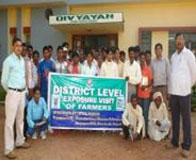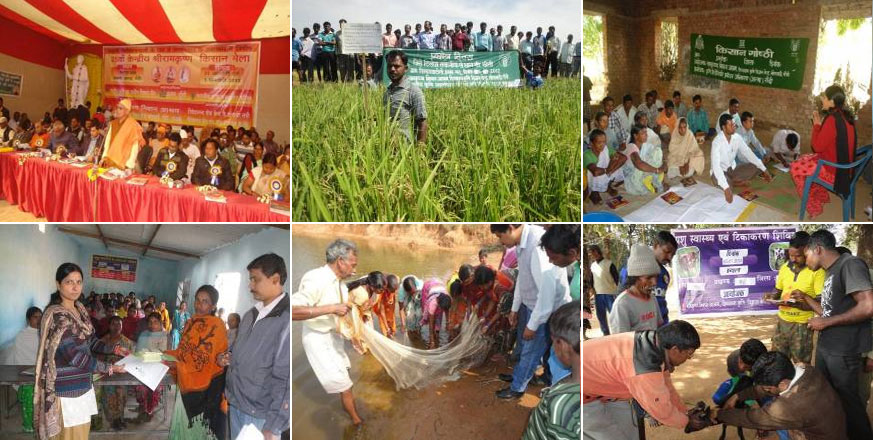Impact of KVK
Details of the output, outcome and socio-economic impact of the various programmes and activity of the KVK on farming community
a. Output, outcome and socio-economic impact of the OFT (Technology Assessment and Refinement):
One of the major tasks of the KVK is to identify and prioritize the problems and suggesting suitable solutions for the farmers of the district. The problem may be either non suitability of technology or in compatibility with the current farming system of farmer. The KVK has to find a way out to reduce the level of risk in adoption of new techniques and make it a part of the existing farming environment / system. The solution should satisfy the farmer and enhancing his decision making ability for adopting a new technology / practice. KVK organized several on-farm research activities for finding out the technologies suitable to the micro-farming situation. The following steps are usually followed.
- Problem identification and prioritization
- Problem analysis in present situation
- Possible Solution
- Experimentation for finding out best solution
- Assessment of results
- Refinement, if required
- Recommendation and diffusion
i. Output of On Farm Testing programme of KVK
On farm testing conducted by KVK has brought significant findings for the farming community of the district. Identified and recommended technologies with required refinement are as follows
Mustard
Assessment of the performance of mustard varieties (like Mahak, Tarak and Pusa brauni, Pusa Bold) under rainfed in medium land situation, Pusa Mahak was recommended to line department for wider dissemination. Previously mustard was taken only as a border crop of potato and other vegetable in Ranchi district. By introducing of improved varieties of mustard Pusa Mahak and motivating the farmers through training programmes, mustard farming was popularizing among farmers and now about 1500 farmers of 25 villages are cultivating mustard as a sole crop and producing 15-16 q/ha which is a significant achievement not only for income generation but also for nutritional security. Besides adding to farmer’s income it also encouraged bee keeping in the area.
Groundnut (Var. M-13)
After assessment of different variety of groundnut through OFT, M-13 was best performer variety among. Next year M-13 variety of groundnut was taken in Front Line Demonstration (FLD) programme in two villages with 40 farmers who were previously producing maize/green gram/black gram. As groundnut cultivation was more profitable than other crops and the variety M-13 which was provided to them was good in quality and yield. Farmers produced 23 quintal/ha compared to local variety which gives 15q/ha. The practice of groundnut cultivation is now spread in nearby villages. Now about 1500 farmers from 10 villages are adopted groundnut cultivation and earning good income from it.
Abhishek and Sahbhagi Varieties of Paddy
Abhishek (in 2008-09) and Sahbhagi (2010) variety of paddy was introduced in Ranchi district by KVK. These varieties are high yielding and multiple disease resistant. Shabhagi, an intermittent drought resistant proved more suitable for rainfed cultivation in the district. After seeing the performance of the crop and response of the farmers, farmers of demonstrated villages and 18 neighboring villages have requested for demonstration of these verities as summer paddy crop in their villages. These were tested for summer season cultivation in the district and found suitable for district. As a result, it is being adopted by more than 10,000 farmers in Ranchi and surrounding districts in both seasons. Besides grain production farmers produced it as seed also. About 4000q certified seed was supplied to Jharkhand government by farmers.
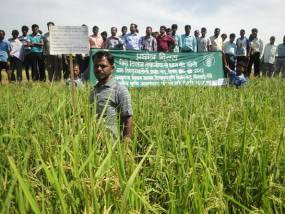
Kufri Pukhraj and Kufri Kanchan varieties of Potato
Farmers of Ranchi district used to cultivate only low yielder local varieties of potato with maximum yield 150q/ha. After introducing Kufri Pukhraj and Kufri Kanchan varieties by, area under potato cultivation has boost in many fold in the district. Kufri Pukhraj variety of potato which is early duration, white coloured and round shaped with yield about 400-450q/ha. 4500 q of foundation seed of potato was produced by Divyayan KVK in 3 years. This variety is also found suitable for late rainy season cultivation in district. Kufri Kanchan variety is a medium duration, red coloured, oblong shaped and late blight tolerant with yield about 400-450q/ha. About 3000qtls of foundation seed of potato was produced by Divyayan KVK in 3 years.
Integrated Pest Management (IPM) in Birnjal
To improve income of small-scale vegetable farmers and preventing them from health hazards IPM programme was implemented by Divyayan KVK in 18 acres of 102 farmer’s field. The programme was implemented by promoting simple, economical and environmentally sound IPM practices against eggplant fruit and shoot borer. It also reduced health risks for brinjal fruit consumers of urban areas. 48 per cent farmers of the project operational area are using IPM module in their fields partially or completely.
Validation and promotion of IPM technology in selected crops in different agro-climatic regions
To improve income of small-scale vegetable farmers and preventing them from health hazards IPM programme was implemented by Divyayan KVK in 13.48 acres for tomato and 23.60acres for cabbage in farmer’s field. The programme was implemented by promoting simple, economical and environmentally sound IPM practices against prevalent pest and diseases of cabbage and tomato. It also reduced health risks for vegetable consumers of urban areas. About 30-35 per cent farmers of the project operational area are using IPM module in their fields partially or completely.
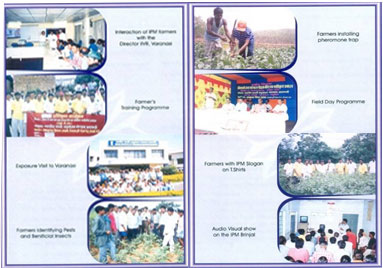
Refinement for more Production through Bee-Keeping
Ranchi is one of the richest district in term of natural resources particularly abundance of forest and flora. Besides the availability of different species of trees and plants in this area, niger and mustard are important oil seed crops cultivated in larger area in this tribal belt which offers huge source of pollen and nectar for bees. Previously only few farmers were doing beekeeping by unscientifically and indigenous method. Due to the lack of scientific know how and skill, farmers were unable to exploit the huge potentiality existing in this area for beekeeping. This is a wonderful source of subsidiary income and complementary to the crop production as well.
Refinement of technology by increasing number of comb from 3 to 5 per frame for Italian bee (Apis melifera), led to boost production from existing bee colonies. As a result of KVK intervention of refined technology accompanied with better management practices, led to large scale adoption of technology. Formation of first Farmer’s producer organization (FPO) of honey producers in state named “Vivekananda Self-supporting Society” is a landmark in development of beekeeping sector in the state.
The Krishi Vigyan Kendra imparted training to about 1200 youths during the period 1995-96 to 2015-2016. KVK has established marketing window in which the trained bee keepers sell the unprocessed honey at a support price fixed by the KVK (presently Rs. 180 per kg.). Raw honey is processed and packed at the KVK and supplied to the users on no profit no loss basis. This helps the bee keepers to sell their products at a very reasonable rate. During the period 1995-96 to 2015-2016 an amount of 1546.88 quintal of honey was procured by the KVK from the trained bee keepers.
It is evident that besides the ex-trainees, other farmers of the nearby villages who have seen the utility of the practice have started bee keeping as an enterprise. Presence of resource for bee keeping and continuous efforts of Krishi Vigyan Kendra by its long duration training programmes and holding of farmer’s bee-keeping work flourished in the area and is adopted by large no. of farmers (4000 farmers), who are rearing about 6000 colonies and about 500 tons of honey is being produced in the district every year. Some of our best beekeeper’s farmers are earning more than Rs. 10 to 15 lakhs per year through beekeeping. It became the main income generation activity for these farmer.
Backyard Poultry farming (DIVYAYAN RED) for income generation
Ranchi district has 28% tribal population, who were doing backyard poultry by traditional methods. A breed ‘Divyayan Red’ is also developed by the KVK which is capable of laying 200-250 eggs per year, so is liked by farmers over local breed who lays only100-120 eggs per year. After intervention of KVK, it was adopted by large number of farmers as a subsidiary source of income. Introduction of good quality breeds of birds by the KVK motivated farmers to adopt it. KVK also works as a resource centre by providing chicks and hatching eggs of this breed to the farmers. Every year about 15000-20000 birds are delivered through KVK to the farmers and institutions.
Assessment of the performance of SRI method of paddy cultivation
In Ranchi district farmers were transplanting paddy by traditional method. By assess of the SRI method of transplanting of paddy and after getting satisfactory result, this method of paddy cultivation was taken in FLD programme. Now, SRI method in paddy cultivation was popularize among farmers and about 5000 farmers of 25 adopted villages of KVK are cultivating paddy by SRI method and harvesting 50 to 70 q/ha which is a significant achievement not only for income generation but also for nutritional security. Besides adding to farmer’s income it also encouraged the saving water and improving the soil fertility. In 2015-16 farmers of Ranchi district were cultivated in more than 5000 ha area of the district.
Some salient outcome and impact of On Farm Testing
Following are some of the KVK identified recommended technologies from OFT which were taken under FLD programmes of KVK, ATMA and other line department for larger area dissemination
- Zero tillage technology for Rabi crops is being taken up by Agriculture department and 100 zero tillage machine were distributed during this season.
- Mustard Pusa Mahak was taken up for demonstration on large scale about 2400ha by Deapartment of Agriculture in Ranchi.
- Abhishek and Sahbhagi variety of Paddy was taken up successfully on large scale by Jharkhand government at state level.
- “Divyayan Red” a KVK developed backyard poultry variety is being taken up for most of demonstrations on backyard poultry in the state. During the year 2015-16 total 7820 chicks supplied for demonstration and till date 140600 chicks supplied by KVK.
- SRI technique of paddy cultivation was opted on mission mode by Deapartment of Agriculture in Jharkhand state and department has demonstrated the SRI technique in more than 5000ha during 2015-16 under various schemes.
- Use of Azolla and tamarind seed in livestock feed being promoted by BAIF and Animal Husbandry department, Jharkhand.
- Zero energy cool chamber for vegetable storage being used by many farmers and also being promoted by Department of Horticulture.
- Potato Kufri Pukhraj and Kufri Kanchan varieties were promoted on large scale through FLD and line departments. 4500 q of foundation seed of potato was produced by Divyayan KVK in last 3 years.
- Non-pesticidal management of Paddy and vegetable crops has been taken up under FLD programme and being adopted as well as appreciated by farmers.
- Shelter management of goat by raised platform is being adopted for demonstration by line departments, NABARD, NGOs under different programmes such as NMSA, Sustainable Agriculture, LEDP, CCKN-IA pilots etc.
- Tomato Arka Rakshak has been taken up by many progressive farmers of the district for commercial farming.
- DAP incubated value added compost application in main field is being practiced by farmers of district for better response by crop.
- Recommendation for use of Karanj (Millettia pinnata) oil + Neem (Azadirachta indica) oil with Camphor to treat and prevent skin problems is being opted by large number of farmers.
b. Output, outcome and socio-economic impact of Front Line Demonstration (FLD) programme
Conducting field demonstrations on farmers' fields is an important activity to show the value of a new practice / technology/ 'Seeing is believing' is the basic philosophy of field demonstrations. These will educate farmers about varieties resistance to pests and diseases, their response to fertilizer use, factors contributing to higher yields and economic gains. The KVK since its inception conducted Front Line Demonstrations (FLDs) on all-important crops in Ranchi and Khunti district. The methodology and brief results are presented below for Oilseeds, Pulses and Other than oilseeds & pulses separately.
Output of Front Line Demonstration (FLD)
- Introduction of new variety of Mustard : Previously mustard was taken only as a border crop of potato and other vegetable in Ranchi district. By introducing improved high yielding variety of mustard Pusa Mahak in Front Line Demonstration and motivating the farmers through training programmes, mustard farming was popularize among farmers and now about 1500 farmers of 25 villages are cultivating mustard as a sole crop and producing 15-16 q/ha which is a significant achievement not only for income generation but also for nutritional security. Besides adding to farmer’s income it also encouraged bee keeping in the area.
- Introduction of new variety of Groundnut (Var. M-13) : Groundnut cultivation was first introduced in two villages with 40 farmers who were previously producing maize/green gram/black gram. As groundnut cultivation was more profitable than other crops and the variety M-13 which was provided to them was good in quality and yield. Farmers produced 23 quintal/ha compared to local variety which gives 15q/ha. The practice of groundnut cultivation is now spread in nearby villages. About 1500 farmers from 10 villages are adopted groundnut cultivation and earning good income from it.
- Introduction of Abhishek and Sahbhagi Varieties of Paddy : Front line demonstration of Abhishek (in 2009-10) and Sahbhagi (2011) variety of paddy was introduced in Ranchi district by KVK. These varieties are high yielding and multiple disease resistant. Shabhagi, an intermittent drought resistant proved more suitable for rainfed cultivation in the district. After seeing the performance of the crop and response of the farmers, farmers of demonstrated villages and 18 neighboring villages have requested for demonstration of these verities as summer paddy crop in their villages. These were tested for summer season cultivation in the district and found suitable for district. As a result it is being adopted by more than 10,000 farmers in Ranchi and surrounding districts in both seasons. Besides grain production farmers produced it as seed also. These varieties are also being promoted by agriculture department under different schemes on KVK recommendation.
- Potato Kufri Pukhraj & Kufri Kanchan : Demonstration of Kufri Pukhraj and Kufri Kanchan varieties by KVK has boost potato cultivation area in many fold in the district. 4500 q of foundation seed of Kufri Pukhraj variety and 3000qtls of foundation seed of potato Kufri Kanchan were produced by Divyayan KVK in 3 years.
Seed Replacement Rate (%)
| Crops | 2008 | 2015-16 |
|---|---|---|
| Paddy (Improved) | 22% | 27% |
Cropping intensity (%)
| 2003 | 2008 | 2015 |
|---|---|---|
| 114 | 116% | 134 % |
Crop - Variety
| Crop - Variety | Area (ha) : 2003 | Area (ha) : 2008 | Area (ha) : 2015 |
|---|---|---|---|
| Vegetable | 0.487 lakh | 0.739 lakh | 1.39 lakh |

Intervention of Formation of Brood Bank concept
There was immense scope in Lac cultivation in Ranchi district, but due to unavailability of good quality of Brood Lac farmers started giving up this work in last few years. With the formation of brood bank of Lac and training of farmers for scientific Lac cultivation about more than 500 farmers from 22 villages are engaged in this work and earning handsome amount.
These farmers were trained by the KVK for scientific lac cultivation and also provided with the basic inputs for the same. Based on problems of insect and pest management in lac cultivation OFT were conducted in different blocks of Ranchi & Khunti district in collaboration with IINRG, Namkum, Ranchi. Adoption of identified technologies of this area was encouraged through FLD programmes. All these efforts of the KVK made this enterprise most successful and income fetching among about 2500 farmers residing in forest areas.
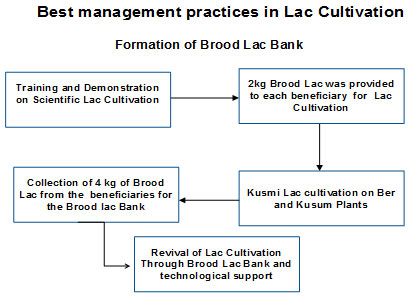
Impact of the Intervention
- Cost benefit ratio before intervention-1:3
- Cost Benefit Ratio after intervention – 1:8
- Average increase in income by Lac cultivation 40000 to 50000/ yr
- Migration reduce 80 %

Bee-Keeping
More than 1200 farmers trained and guided by Divyayan KVK are engaged in Bee-Keeping. Apis mellifera (Italian Bee) colonies were introduced to farmers which was successfully reared by them and now some of the bee keepers trained by Divyayan KVK are earning upto 10-15 lakhs per year through this enterprise. As forest trees like Karanj, Eucalyptus etc. are present in plenty in this area. Farmers are now motivated for beekeeping in mango and litchi plantation too. Mustard is also being grow in large area after intervention of KVK through FLD and OFT programmes. Presence of resource for bee keeping and continuous efforts of Krishi Vigyan Kendra by it’s different programmes and hand holding of farmers, bee-keeping work flourished in the area and is adopted by large number of farmers (4000 farmers), who are rearing about more than 6000 colonies and about 500 tons of honey is being produced in the district every year.
KVK not only provides training but also provides bee-boxes and colonies after training to the farmers. They also get support from KVK for linkage with banks. After getting loan from bank they start the work. Honey testing and marketing are also being done by the KVK to support the bee keepers. In this way Ranchi KVK is considered as best KVK in Jharkhand in bee keeping area.
Some of our best beekeepers farmers are earning more than Rs. 3 lakhs per year through beekeeping. It is the main income generation activity of this area.
Backyard Poultry and duck farming for income generation
Development and demonstration of poultry breed ‘Divyayan Red’ which is capable of laying 200-250 eggs per year, has made backyard poultry a profitable enterprise for the farmers. Every year about 15000-20000 birds are delivered through KVK to the farmers and institutions. This breed is now popular across the state and is most preferred breed for institutional demonstration as well as distribution under government schemes.
Besides poultry birds two breeds of duck named ‘Khakhi Campbell’ and ‘Vigova Super’ are being reared by our KVK for providing it’s ducklings to farmers and institutes. Ranchi KVK is the biggest centre of ‘Khakhi Campbell’ in the state. It is also being taken by farmers and institutes of other states.
Intervention of Zero tillage technology in wheat cultivation for conservation agriculture
Zero tillage technology in district was introduce by KVK in collaboration with CYMMIT few year back at Khakhra is a village in Burmu block. Since then KVK has promoted this technology thorough FLD and now with the efforts and recommendation of KVK at various level, Department of Agriculture, Government of Jharkhand has opted the technology for large scale adoption and 100 zero tillage machines are being distributed this year to farmers of Ranchi district under special programme for Rabi cultivation on rice fallow land, which is a pilot scheme for doubling the farmers income.
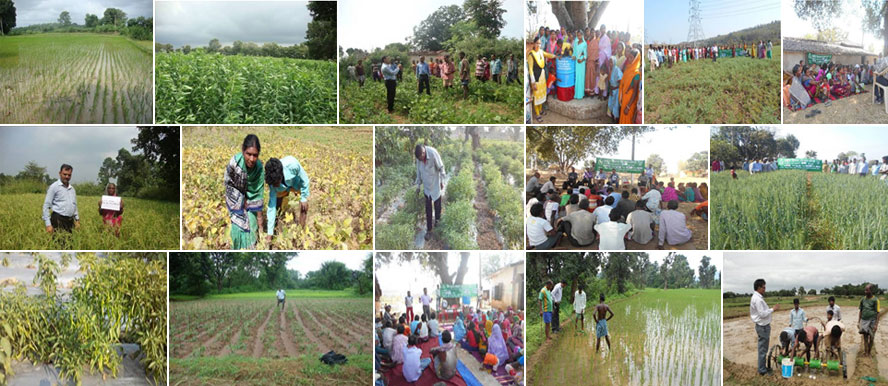
ii. Outcome and Impact of Front Line Demonstration
Front line demonstration conducted by KVK has very positive impact on farming community of the district, technologies demonstrated were adopted by the farmers as well as allied groups for increasing productivity and minimizing input cost along with best management practices to fetch more income. As a result of combined efforts significant change is visible across the farming sector of district and nearby areas too. Increasing income from agriculture sector attracted youth of the district to establish themselves as successful agri-preneures, hence reducing rate of migration. Some of our technologies which brought vital change in farming scenario are as follows
- Revival of lac production as livelihood option of the tribal communities, which has boosted the lac production of the state and resulted in making the state largest producer of lac for this year. 500 farmers from 22 villages are engaged in this work and earning up to 2-3 lac / year.
- Raised bed technique of vegetable cultivation promoted through KVK FLD has been adopted by vegetable growers on large scale.
- Zero tillage technique demonstrated under FLD programmes of KVK has been picked up by farmers as well as agriculture department for Rabi sowing. Considering the importance of this KVK recommended technology, 100 nos. of zero tillage machines are being distributed among farmers on cluster basis for large scale dissemination and adoption of technology.
- Refined bee-keeping technique along with suitable management practices made this enterprise profitable. This technique has attracted young progressive farmers to adopt bee-keeping as main livelihood enterprise which has inspired more than 5000 farmers to join this sector led to formation of FPO.
- Introduction of Mustard Pusa Mahak has brought significant change in the yield, which has change attitude of farmers towards mustard cultivation. Farmers started to grow mustard as sole crop in larger areas instead of intercrop with vegetable and cereals, as done previously. 25 villages are cultivating mustard as a sole crop and producing 15-16 q/ha which is a significant achievement not only for income generation but also for nutritional security.
- Popularization of high yielding disease resistant Paddy variety Abhishek has been adopted on mass scale in district. This variety is also being used for distribution under different schemes of agriculture department on recommendation of KVK for cultivation on mid land, which has increased the productivity of rice in district. As a result it is being adopted by more than 10,000 farmers in Ranchi and surrounding districts in both seasons.
- Stress tolerant Paddy variety Sahbhagi, which was taken for FLD programme has widely been accepted and being opted by farmers of district for cultivation on upland and midland rice fields due to its intermittent drought tolerant nature. This variety is also being promoted by state government under different schemes of agriculture department as per recommendation of KVK.
- KVK recommendation for use of Azolla in animal feed has been widely accepted by farmers as well as animal husbandry department for increasing productivity and profit from animal husbandry sector in the district.
- FLD on disease management in goat through vaccination and shelter management has bring down morbidity and mortality rate of goat in the district.
- FLD on drudgery reducing implements like cono weeder, plastic drum seeder, cycle wheel hoe, paddy para-boiling unit etc. for farm women had proved very useful in efficient time and energy management while performing different jobs. Hence these implements are being adopted by farm women on large basis and promoted by line department too.
- Potato Kufri Pukhraj and Kufri Kanchan varieties has changed production scenario of district after being popularised by KVK through FLD now these varieties are the among the first choice of potato growers.
- Groundnut M-13 adoption has replaced upland rain fed paddy cultivation in 15 villages of Angara block initially and became a major crop in upland field of these villages. This crop is also spreading widely in other blocks of district and nearby areas due to more profitable nature in comparison with upland paddy.
A. Output of training programme
Training is regarded as one of the integral components of development programmes. Conducting need-based and skill oriented training to its clientele is one major activity of the KVK. KVK conducts several need based training programmes on routine basis with various aspects of improved technologies related to agriculture and allied activities. It is extended to different clientele including practicing farmers, farmwomen, rural youth and extension functionaries. The training imparted by Divyayan KVK is essentially need-based and skill oriented with emphasis on ‘learning by doing’. The main objective of the programme is to effect transfer of appropriate technology in easily comprehensible manner to the grass-roots level trainee farmers. To achieve this objective a number of courses, both long term and short term with different course contents, are designed and conducted. The trainees selected to derive the benefit from the programme are generally practising farmers and school drop-outs who hail from the small and marginal class of farmers.
Training Sequence
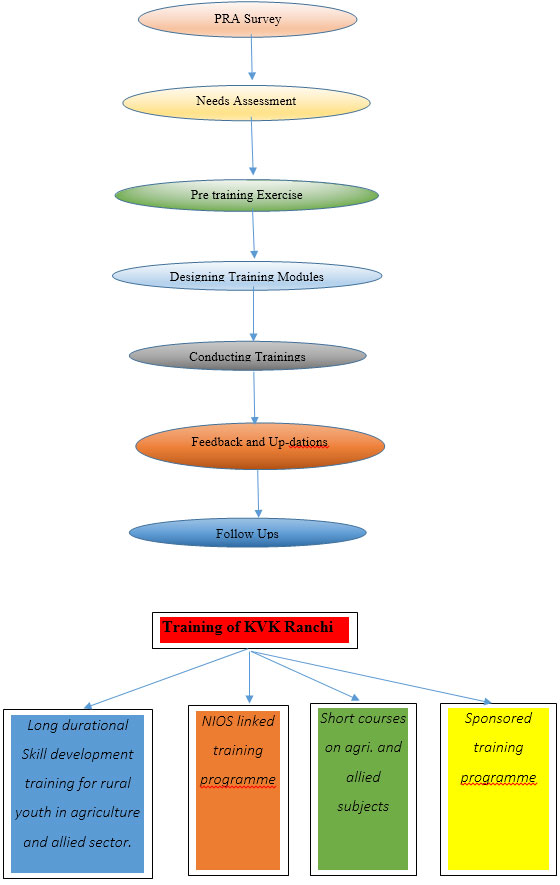
Model training programmes organised by KVK
The training programme at Divyayan KVK has been designed in two streams, namely on-campus and off-campus. KVK is conducting long duration residential skill development training programmes since years for tribal youth sponsored by Ministry of Tribal Affiars.
1. Basic training on Integrated Agriculture
These are organised continuosly at every six week (45 days) interval. During the training period, efforts are mainly devoted to impart preliminary training by improved methods in theory and practice in all disciplines of agriculture and allied subjects like- Agronomy, Soil Science, Horticulture, Animal Husbandry, Plant protection, Agriculture Engineering, Home Science, Plant Breeding, Bee-keeping, Lac cultivation etc. The programme is specially designed to suit with nature and learning abilities of tribal of the area. It is free of cost and includes boarding as well as lodging facilities and also provision of working uniform. Besides class room lectures and routine practical classes, trainees are taken for exposure visit to pioneer enterprises of concern trade. While they remain as residential trainees, they are required to follow a daily routine, beginning with yoga classes and other personality development classes, planned as to keep them actively engaged in learning things without experiencing any boredom. The trainees participate in an integrated programme aimed at imbibing in them a fellow-feeling and brotherhood at the same time to make them acquire proficiency in the agricultural and allied technologies. The model of training is appreciated by the department and recognised as “Divyayan Model Training Programme” at national level by ministry of tribal welfare.
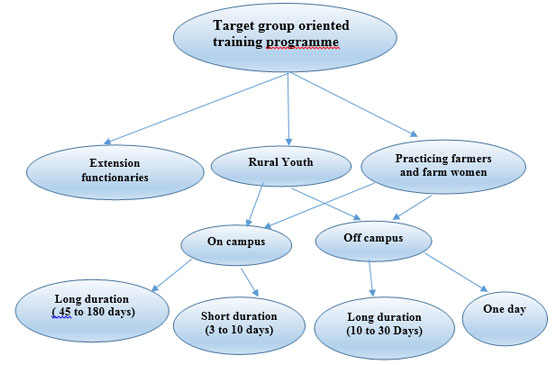
2. Trade Specialised Courses
Besides the motivational training courses descibed earlier Special courses ( 45 days to 180 days) in various areas are also organised. The trainees who complete the motional courses, may join these programmes for obtaining further skill if they so desire. These courses are of longer duration and are practice-oriented. Stress is given in these courses to help the trainees in acquiring greater specializtion of the area under study. They are put through extensive practical demonstration and field work to achieve greater proficiency to manage their won enterprises with confidence. Evaluation is an integral part of KVK training programme. The knowledge gain of trainees as a result of training is usually assessed through pre and post evaluation.
The learning opportunities are provided to the clientele based on their needs through training and with an expectation for adoption of technologies in their back home situations. KVK regularly takes up the follow-up evaluation of training for identifying the gaps in adoption and tries to improve the performance of trainees in terms of achieving their set objectives. Trained villagers are prepared as master trainer by the concern scientist to provide training in villages and solve emerging problems of farming community. Some master trainers in field of animal husbandry and artificial insemination are working immensely in villages for breed improvement in animals and primary treatment of animals. They also participate actively during animal health camps and vaccination programme being conducted by the KVK in villages.
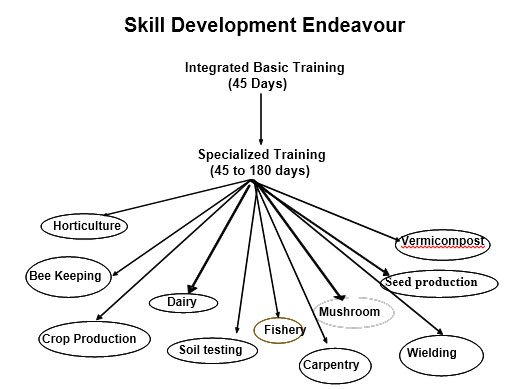
3. Special Training to Primitive tribes was organized in 10 batches for 413 farmers of primitive tribe groups for the duration of 10days per batch on integrated farming. The training was sponsored by Jharkhand Tribal Development Society.
4. Job opportunity linked training programme “Tata Rallies Agri. Input Training Scheme (TRAITS)” was organized for 43 educated rural youth. The beneficiaries were from Ranchi, Khunti, Ramgarh and Hazaribagh districts of Jharkhand. The main aim of programme was to develop human resource for rural marketing of agri-inputs. Selected candidates were trained by KVK. Tata Rallies has linked these trainees with their system and other companies for absorption.
5. SHG based training programme for farm women are organized on routine basis by the KVK. Need based training on goat farming, piggery, organic farming, agri-input production, food processing etc. were provided with the objective making SHG self-reliant.
Impact of training programmes
This KVK is known for providing skill oriented, specially designed quality training programmes at state and national level. KVK is often appreciated by authorities, public representatives and farmers at different levels. It resulted in providing opportunities to KVK for training of personnel (farmers/ extension functionaries) not only from other districts but also from other states. Enterprenurship being the central objective of the training had reflected into developing number of agri- entrepreneurs of state and national level. Many of KVK trained farmers are earning upto 4-5lakhs annually besides that they evolved themselves as role model and inspired many farmers for adopting the agri-prenureship models. Some of them have received recognition from concern authorities, state and central governments.
Ranchi district with its 72% area owned by small and marginal farmers. Forty eight percent of the small and marginal farmers belong to tribal community. The average size of holding of small and marginal farmers is 0.62 ha. In this scenario integrated farming proved as best sustainable farming system. Most of KVK training programmes focused on Integrated Farming System brought significant change in the income pattern and livelihood options for the farmers. Lac production, bee-keeping with commercial horticulture, piggery and goatery along with duckery and fishery etc. enterprises emerged as best prominent enterprises for additional source of income. Training along with hand holding by KVK has supported the most deprived and backward section of society to come up with a new way of self-reliance within their village.
Now after continuous efforts of KVK, farmers are gradually changing their farming system from traditional agriculture to scientific agriculture. Some of them are taking more than one crops in a year few of them are taking even 3-4 crop in a year on same piece of land, thus contributing in increasing productivity of the district. This resulted in bringing up the cropping intensity of the district 123 per cent with below 13 per cent irrigated land. Significant changes has been marked in horticulture crops, honey and lac production, fisheries and animal husbandry sector. In this way KVK played important role not only in developing human resources but also contributing significantly in changing agriculture and allied sector growth rate of the district.
Details of achievements of some successful rural youth are given in following table
| S.N. | Name | Address | Training Received | Year | Annual Income Before Training | Annual Income After Training | Impact |
|---|---|---|---|---|---|---|---|
| 1 | RADHAKANT GIRI | Vill.-Bhatboreya, Post - Baraudi, Block - Burmu, District- Ranchi. | Beekeeping | 1997 | Nil, as he was student. | 15,00,000/- | Established first private sector honey processing plant. Remarkable improvement in life-style. Two children studying in prestigious schools, At Present keeping 400 beehives. Engaged 10 persons as employee. Motivated 200 farmers for Beekeeping. This year formed FPO in bee-keeping |
| 2 | Sarwan Gupta | Mahilong, Namkom, Ranchi | Fruit Nursery | 2007 | 25000/- | 2500000/- | Today his nursery houses more than 2 lakhs fruit plants and 2.5 lakhs timber plants and the largest private supplier of saplings in Jharkhand. His nursery has been rated as 3 Star by NHB. He provided job to about 40 rural youth in his nursery. His innovations were recognized and published by ICAR-IIHR. |
| 3 | RAJESH MAHLI | Vill. - Murumgarha Block - Burmu, District- Ranchi. | Poultry | 2001 | 24,000/- | 200000/- | Helps to educate sister up to graduate. Constructed house. Inspired 20 persons to open Poultry Farm. |
| 4 | BALESHWAR BEDIA | Vill- Putadag, Block-Angara, District-Ranchi | Lac cultivation | 2004 | NIL | 500000-600000 | He is one of the biggest individual producer of lac as well as brood lac in the district. He has been recognized and awarded by at different level as well as ICAR-IINRG. |
| 5 | HALDHAR MAHTO | Vill.- Bhuiyadih, Post- Baburamdih, Block - Tamar, District -Ranchi. | Welding & Integrated farming | 1987 | 30,000/- | 600000/- | Recognized as biggest commercial vegetable farmers by ICAR- Research complex for eastern region, HARP, Palandu, Ranchi |
| 6 | SURA ORAON | Vill. - Kambo, Post - Kambo, Block - Mandar, District- Ranchi. | Poultry | 1999 | 10,000/- | 5,73,000/- | Well established poultry farm with capacity of 2500000 birds. |
| 7 | BIRSA OREA | Vill-Gutigara, Block - Muru, District- Khunti | Integrated Agriculture | 2011 | 25000 | 4,80000 | Cultivated tomato in six acre. Motivating boys to tomato cultivation |
Successful farmers were trained as master trainer and used as a resource person in the regular training programme.
Animal Husbandry
- Kunwar Dewgan
- Mahadev Bedia
- Srimant Kr. Mahto
- Saroj Kr. Mahto Mob
- Falendra Mahto
- Panda Munda Mob
- Binod Kr. Yadav Mob
- Manrakhan Mahto
- Shri Sura Oraon
- Shri Naresh Munda
- Shri Pradeep Kr. Puran
- Shri Rabindra Prajapati
- Shri Rajesh Mahli
Mushroom Production
- Shri Vijay Sanga Mob
- Shri Suraj Dev Baraik
Bee-keeping
- Radhakant Giri
- Shri Kalicharan Mahto
- Shri Mangraj Toppo
Agricultural Implements
- Shri kartick Lohra
- Shri Hindu Hunnai Purti
- Shri Barun Kr. Pathak
- Shri Bhupendra nath Prasad
- Shri Arjun Shankar Purti
- Shri Sagar Purti
- Shri Ramdev mahto
- Shri Bholanath Kushwaha
- Shri Ajit Bhagat
- Shri Ramesh Munda
Vermi – Composting
- Shri Mangra Oraon
- Shri Bartu Bedia Mob
Horticulture
- Shri Hindu Tuti,
- Shri Roshan Kumar
- Shri Arjun Karmali
- Shri Baij Nath Kr. Munda
- Shri Ramesh Munda
- Shri Manoj Mahto
Fisheries
- Shri Rupdev Oraon
- Shri Sanjay Bedia
- Shri Manoj Kr. Bedia
- Shri Devanand Sahu
- Shri Rajkishor Matho
Lac Cultivation
- Sri Sanika Bedia
- Sri Karam Singh Bedia
- Sri Tejua bedia
- Sri Baleshwar Bedia
- Sri Narayen bedia
- Sri Sandeep Bodra
- Sri Ramesh Chand Kumar
- Shri Rajeshwar Bedia
B. Output, Outcome and Impact of Extension Activities
The farmers need to have knowledge not only about the improved farm techniques, but also they should aware of other aspects related to production systems, research institutions, schemes and programmes of various development departments. In order to create wider awareness about all these aspects, KVK is conducting various extension activities like Farmers Days, Field Days, film shows, sex-trainees conference, farmers fair, exhibitions, etc. for the benefit of farming community of the district. It has been experienced that any training course short or long, is not enough to sustain and motivate the farmers for deriving benefit out of the knowledge gained at Divyayan KVK. In the earlier years, it was observed that many of them fall back on their old practices and prejudices after returning to their own villages. A constant follow up to keep track with them has therefore, been found to be indispensable. In order to fulfill the above requirement a multi-pronged approach has been launched for maintain a regular liaison for imparting direction/guidance to the ex-trainees to overcome difficulties in their work-a-day life. This follow-up programme forms the core of extension activity of Divyayan Krishi Vigyan Kendra. This KVK has adopted 124 villages of Ranchi, Khunti and Ramgarh District and each village has got its own Farmers’ Science club known as Vivekananda Seva Sangh (VSS). These VSS have been clusters in Block and formed a registered Block level voluntary organization in four blocks of Ranchi district. They are empowered to execute all kinds of developmental activities like, Demonstration, Field Days, Kisan Gosthi, Kisan Mela, Exposure Visit, Ex-trainees Conference, Awareness camp, Health Camp etc.
The extension activities of the KVK are covered regularly in all the leading newspapers of the district. Besides, KVK has published extension literature (Divyayan Samachar hindi monthly news letter, leaflet, CD, folders, etc.) on all major aspects of agriculture technology relevant to the needs of farming community and distributes to farmers, trainees, visitors, extension personnel etc.
1. Three-tier extension systems
i) 1st Tier : In each of our adopted villages, there are two principal functionaries (change agent/key communicators). They are ex-trainees and trained further for their special functions. They supervise and monitor all developmental activities of their own village through its own organization- Vivekananda Seva Sangha (VSS).
ii) 2nd Tier : There are many field assistants of Divyayan who hail from the local areas. They are all ex-trainees. They are entrusted with the duty to look after a cluster of villages in rotation and thereby visit each village in every month to reach other ex-trainees to guide them not only in farm practices but also in other development affairs. They motivate the villagers to undertake different welfare activities. They get feedback from the main functionaries of the village and report to the scientist of Divyayan KVK weekly.
iii) 3rd Tier : Scientist of Divyayan KVK visit villages regularly for transferring technology and follow-up activities.
Innovative methodology of Transfer of Technology at district level by the KVK
i) Formation of village and block level organization to empower them to execute project work through trained youth from Divyayan KVK.
ii) Village level, then block level and subsequently at Divyayan central level feed back meeting in every month for review of last month is work and action plan for coming month.
iii) Successful farmers were trained as master trainer and used as a resource person in the regular training programme.
iv) Empowerment of women for gender equity by forming 278 women self help groups and linking them with different income generation activities.
v) In 4 blocks of our operational area 4 villages resource centers have been established with video conferencing facility. Large number of farmers is being benefited through scientist-farmers interaction on every Friday.
With these three tiers of follow-up system, Divyayan Krishi Vigyan Kendra has been able to establish a strong linkage between the farmers and the scientists.
2. Ex – Trainees Monthly Meeting at Divyayan KVK
In order to reduce communication gap and also to establish a strong relation between the Divyayan KVK and its ex-trainees, a meeting on the last week of every month is organized at Divyayan KVK regularly. The main function of this meeting is to bring the main functionaries of VSS to discuss various problems they may be facing. A printed agenda is provided to them for further discussion in their village meeting. All scientists and field assistants participate, in addition to ex-trainees, in the meeting to provide technical and other types of guidance. The usual constraints and unforeseen problems faced by the farmers due to lack of resources for procuring the inputs, special problems in cultivation, late break of monsoon, long dry spells etc. are discussed. In these meetings, officials of state Govt, Agriculture University, ICAR institute, Banks also participate. The schedule for off-campus training and others related programmes are prepared for the next month, as well field visits by faculty members in consultation with VSS representatives.
3. Ex-Trainees Sammelan
This is an annual meet of the ex-trainees for one day at block level with an agenda covering a wide area. In each sammelan 500 to 600 ex-trainees of different block of Ranchi and others districts participate. In these sammelans, besides the ex-trainees, Govt officials, public representatives, Bank representatives also participate. These sammelans provide a forum to the officials to highlight the schemes and receive feedback from the beneficiaries.
As an outcome of mutual discussion, a minimum action plan is evolved and this is implemented by the VSS in respective areas. Implementation of these action plans are discussed in the sammelan during next year. These sammelans have paved a way for establishing a direct link between the officials and the farmers, cutting short unnecessary delays.
4. Farmers Fair- Regional and Central
Kisan Melas exhibiting agricultural farm produce are becoming a very successful media for communication to the farmers, Once a year Central Kisan Mela at Divyayan demonstration farm at Getalsud is organized for tow-days. This year (2015-16) a two days 38th central kisan mela has been organized. In addition, four Block-wise regional level one –day Kisan Melas with minimum assistance from Divyayan. In these Melas, “KisanGosthis”, exhibition of crops, vegetables, animals, etc. are arranged by the farmers themselves, without any guidance by Divyayan Dignitaries from the district and elsewhere and kisan delegates from the villages are invited to exchange views and information. Farmers are awarded prizes for excellence in agricultural production. As a result these melas have been found to be very effective and are yielding encouraging results.
5. Field Days
The KVK is conducting Field Days on all important crops of the area, usually at the middle or end of the crop season and in most convincing stage of the crop for the visitors. The crop technologies demonstrated through the FLD programmes are highlighted during the Field Day event. Field Days are being participated by the farmers of the village, neighbouring villages, field extension staff, scientists of KVK and other institutions.
6. Mobile Audio-Visual Unit
This unit moves about in the villages giving audio-visual education through video- cassettes, 16 mm films etc on various aspects of rural development, primarily agricultural production. This unit is increasingly becoming popular in the adopted villages. It works regularly on the basis of monthly programmers drawn up in monthly meetings.
Mobile Agro-Clinic and Agro Service Unit
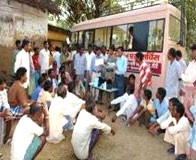
Kisan Ghosti in village
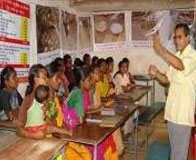
Women Group Involved in Soap making in village
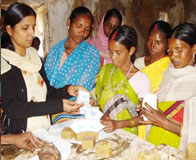
Soil testing campaign
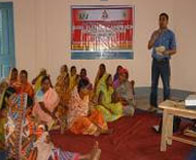
Animal Vaccination
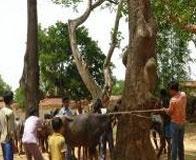
Exposure Visit
